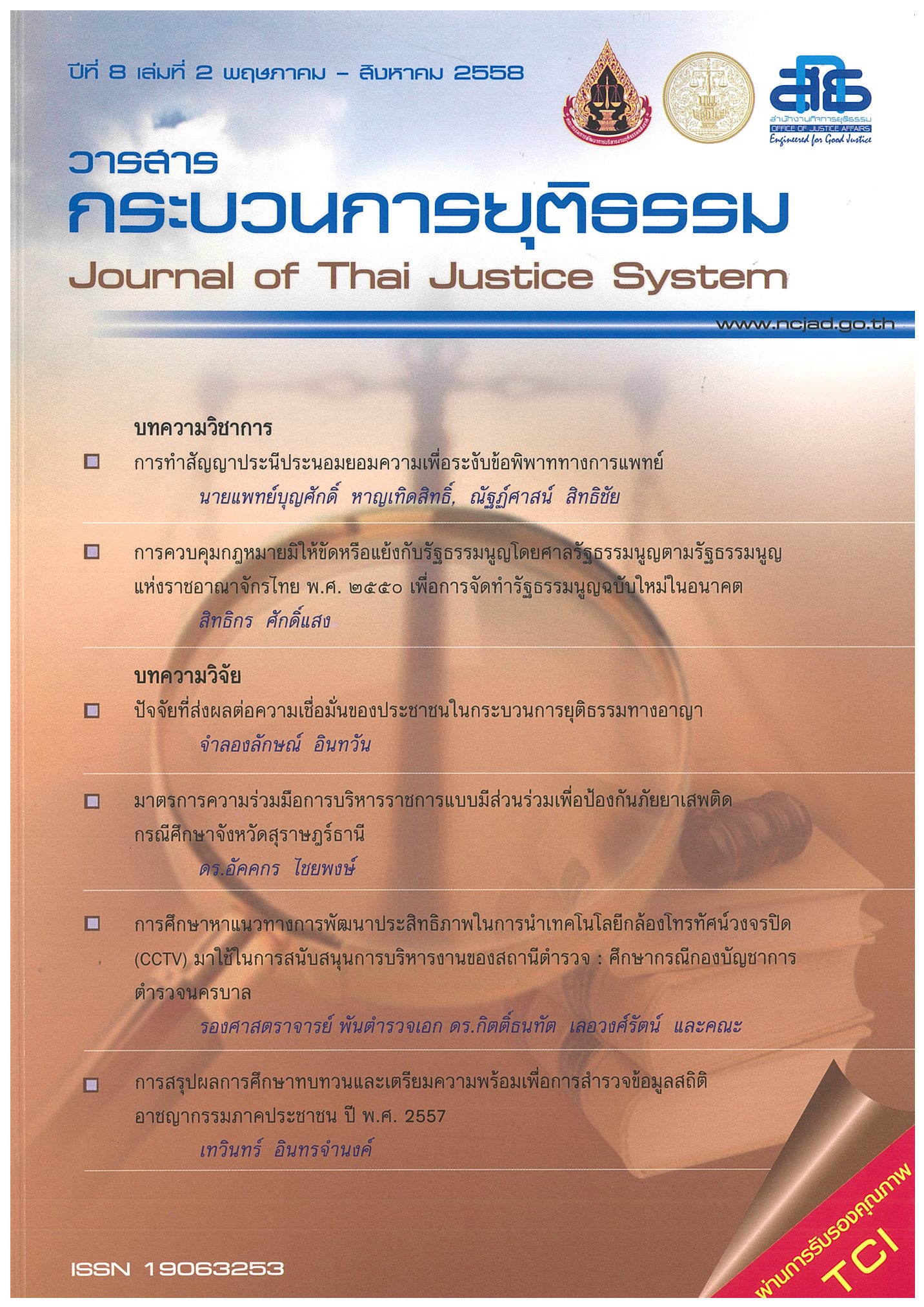ปัจจัยที่ส่งผลต่อความเชื่อมั่นของประชาชนในกระบวนการยุติธรรมทางอาญา
Main Article Content
บทคัดย่อ
การวิจัยครั้งนี้มีวัตถุประสงค์เพื่อศึกษา และสังเคราะห์แนวคิดเกี่ยวกับปัจจัยที่ส่งผลต่อความเชื่อมั่นของประชาชนในกระบวนการยุติธรรมทางอาญาตลอดจนศึกษาปัจจัยที่ส่งผลต่อความเชื่อมั่นของประชาชนในกระบวนการยุติธรรมทางอาญา การวิจัยครั้งนี้ใขช้ระเบียบวิธีวิจัยแบบผสม โดยมีขั้นตอนในการวิจัยแบ่งออกเป็น 2 ระยะ คือ ระยะที่ 1 การศึกษาและสังเคราะห์แนวคิดเกี่ยวกับปัจจัยที่ส่งผลต่อความเชื่อมั่นของประชาชนในกระบวนการยุติธรรมทางอาญา และระยะที่ 2 การศึกษาปัจจัยที่ส่งผลต่อความเชื่อมั่นของประชาชนในกระบวนการยุติธรรมทางอาญา แหล่งข้อมูลและผู้ให้ข้อมูลประกอบด้วย เอกสารและงานวิจัยที่เกี่ยวข้องในระหว่างปี พ.ศ. 2544 ถึง พ.ศ. 2554 และประชาชนที่อยู่อาศัยในภูมิภาคต่างๆ ของประเทศ จำนวน 800 คน เครื่องมือที่ใช้ในการเก้บรวบรวมข้อมูลได้แก่แนวทางการศึกษาและสังเคราะห์เอกสาร และแบบสอบถาม การวิเคราะห์ข้อมูลข้อมูลเชิงคุณภาพ โดยเทคนิคการวิเคราะห์เนื้อหา ข้อมูลเชิงปริมาณ ใช้วิธีการวิเคราะห์ทางสถิติ ได้แก่ ร้อยละ ค่าเฉลี่ย ส่วนเบี่ยงเบนน มาตรฐาน และการวิเคราะห์เส้นทาง
ผลการวิจัย พบว่า
1. ผลการศึกษา และสังเคราะห์แนวคิดเกี่ยวกับปัจจัยที่ส่งผลต่อความเชื่อมั่นของประชาชนในกระบวนการยุติธรรมทางอาญา
ผลการศึกษา และสังเคราะห์แนวคิดเกี่ยวกับปัจจัยที่ส่งผลต่อความเชื่อมั่นของประชาชนในกระบวนการยุติธรรมทางอาญา พบว่า ปัจจัยที่ส่งผลต่อความเชื่อมั่นของประชาชนในกระบวนการยุติธรรมทางอาญาประกอบด้วย ปัจจัยด้านสถานการณ์ ได้แก่ การรับรู้เกี่ยวกับการบริหารจัดการตามหลักธรรมาภิบาล การรับรู้สภาพเศรษฐกิจ การเมืองการปกครองและสังคม การรับรู้ความสามารถของบุคลากรในกระบวนการยุติธรรมทางอาญา และการรับรู้ข้อมูลข่าวสารเกี่ยวกับกระบวนการยุติธรรมทางอาญา ปัจจัยด้านจิตลักษณเดิม ได้แก่ เหตุผลเชิงจริยธรรมลักษณะมุ่งอณาคตและควบคุมตน แรงจูงใจใฝ่สัมฤทธิ์ และสุขภาพจิตดี และปัจจัยด้านจิตลักษณะตามสถานกาณ์ ได้แก่ ทัศนคติต่อกระบวนการยุติธรรมทางอาญา
2. ผลการศึกษาปัจจัยที่ส่งผลต่อความเชื่อมั่นของประชาชนในกระบวนการยุติธรรมทางอาญา ผลการศึกษาปัจจัยที่ส่งผลต่อความเชื่อมั่นของประชาชนในกระบวนการยุติธรรมทางอาญาพบว่า ปัจจัยที่ส่งผลต่อความเชื่อของประชาชนในกระบวนการยุติธรรมทางอาญาที่มีอิทธิพลทางตรง ได้แก่ การรับรู้ข้อมูลข่าวสารเกี่ยวกับกระบวนการยุติธรรมทางอาญา และการรับรู้สภาพเศรษฐกิจ การเมืองการปกครอง และสังคม ตามลำดับ โดยทั้ง 3 ตัวแปรสามารถอธิบายความแปรปรวนของความเชื่อมั่นในกระบวนการยุติธรรมอาญา ได้ร้อยละ 41 และยังคงพบว่ามีปัจจัยที่ส่งผบต่อความเชื่อมั่นของประชาชนในกระบวนการยุติธรรมทางอาญาที่มีอิทธิพลทางอ้อม ได้แก่ แรงจูงใจใฝ่สัมฤทธิ์ การรับรู้ความสามารถของบุคลากรในกระบวนการยุติธรรมทางอาญา การรับรู้สภาพเศรษฐกิจการเมืองการปกครอง และสังคม สุขภาพจิตและการรับรู้ข้อมูลข่าวสารเกี่ยบวกับกระบวนการยุติธรรมทางอาญา ตามลำดับ ซึ่งทั้ง 6 ตัวแปรสามารถอธิบายความแปรปราวนของทัศนคติที่ดีต่อกระบวนการยุติธรรมทางอาญา ได้ร้อยละ 95 นอกจากนี้ยังบว่า ปัจจัยที่ส่งผลต่อความเชื่อมั่นของประชาชนในกระบวนการยุติธรรมทางอาญาที่มีอิทธิพลรวมมากที่สุด คือ ทัศนคติต่อกระบวนการยุติธรรมทางอาญา การรับรู้เกี่ยวกับการบริหารจัดการตามหลักธรรมาภิบาลแรงจูงใจใฝ่สัมฤทธิ์ สุขภาพจิต การรับรู้ความสามารถของบุคลากรในกระบวนการยุติธรรมทางอาญา ตามลำดับ
Article Details
ต้นฉบับที่ได้รับการตีพิมพ์ในวารสาร เป็นลิขสิทธิ์ของวารสารกระบวนการยุติธรรม แต่ความคิดเห็นที่ปรากฏในเนื้อหาของบทความในวารสารกระบวนการยุติธรรม ถือเป็นความรับผิดชอบของผู้เขียนแต่เพียงผู้เดียว
เอกสารอ้างอิง
ณรงค์ กุลนิเทศ. (2549). บุพปัจจัยของกระบวนการรับรู้ทัศนติและแนวโน้มเชิง พฤติกรรมในการพิสูจน์หลักฐานที่มีต่อความเป็นธรรมทางสังคมที่เล็กเห็นโดบบุคลากรในกระบวนการยุติธรรมทางอาญา. ดุษฎีนิพนธ์สาขาวิชาการบริหารการพัฒนา แขนงวิชาการบริหารงานยุติธรรม มหาวิทยาลัยราชภัฎสวนสุนันทา.
ดวงเดือน พันธุมนาวิน. (2548). "ทฤษฎีต้นไม้จริยธรรม ธรรมสำรหับคนไทย : อดีต ปัจจุบันและอนาคต" ในแลหลังมุ่งหวังอนาคต. สถาบันวิจัยพฤติกรรม มหาวิทยาลัย ศรีนครินทรวิโรฒ.
บุษยา จินันทุยา. (2553). ปัจจัยที่ส่งผลต่อความไว้วางใจของนักท่องเที่ยวในการซื้อสินค้าและบริการผ่านบริษัทนำเที่ยว. ปริญญานิพนธ์ ศศ.ม. สาขาวิชาการจัดการโรงแรมและการท่องเที่ยว มหาวิทยาลัยราชภัฏสวนดุสิต. (2552).
ประชาชนคิดอย่างไร ? กับกระบวนการยุติธรรมของประเทศไทย [ออนไลน์]. เข้าถึงข้อมูลวันที่ 9 กันยายน 2552. จาก http://dusitpoll.dusit.ac.th/polldata/data_52.html
ศิริพร แย้มนิล และ จินตนา บิลมาศ. (2551). ปัจจัยด้านจริยธรรมที่ส่งผลความเชื่อถือไว้วางใจของประชาชนต่อภาครัฐ. วารสารสังคมศาสตร์และมนุษยศาสตร์, 34 (2), 124-136.
สำนักงานกิจการยุติธรม. (2552). แผนแม่บทการบริหารงานยุติธรรมแห่งชาติ พ.ศ. 2552 - 2555. กรุงเทพ : สำนักงานกิจการยุติธรรมกระทรวงยุติธรรม.
Burke, C., Shawn, S., Dama,E.,Lazzara,E.H.,&Salas, E. (2007). Trust in leadership : A multi-level review and intergration. The Leadership Quarterly, 18, 606-632.
Dietz, G. and D. N. Den Hartog (2006). "Measuring trust inside organisations". Personnel Review, 35(5), 557-588.
Marshall, E.M. (2000). Building trust at the speed of change : The power of the relationship - based corporation. New York : McGraw - Hill.
Mayer, R. C.; Davis, J. H.; & Schoorman, F.D. (1995). An integrative model of organizational trust. Academy of Management Review, 20 (3), 709-734.


